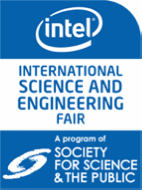
Five projects involving solar energy conversion, robotics, biological disease control and a device for teaching music, will represent Costa Rica in the fourteenth edition of the International Intel Science and Engineering Fair (ISEF) from May 9 to 13 in Los Angeles, California.
The winners
- Francel Red Simpson from Caribbean Bilingual School for her project about solar energy conversion motive power.
- Franklin White, Fabian Badilla, and Alessa Calderon from San Carlos College for their idea of isolation and culture of protoplasts in edible aroids.
- Franklin Chacón, Dylan Bartels and Juan Carlos Cambronero from the Scientific School of Costa Rica, San Pedro headquarters, for the use of the entomopathogenic fungus Metarhizium anisopliae for biological control of Aedes aegypti mosquito.
- Jose Miguel Gonzalez and Nicole Mena Don from Bosco Technical College for INNOVI, interpreting notes from their vibration.
- Luis Gerardo León from José María Gutiérrez College Finally for the ARES project (autorobot of sensorial exploration).
Selected students will receive mentoring support from Intel, who will help them prepare for the coming months for their appointment at ISEF in USA. ISEF is considered the largest college science and engineering fair in the world. It involves over 1,500 students from over 60 countries.
The winner were selected at the National Center for High Technology (CENAT). Present: Clotilde Fonseca, Minister of Science and Technology, Leonardo Garnier, Minister of Education, Anne S.Andrew, U.S. Ambassador, Marjorie Henderson, representing the University of Costa Rica and Karla White, Manager of Corporate Affairs, Intel Costa Rica.
Just after 3:00 pm on January 27, the team of judges from the Ministry of Science and Technology, the University of Costa Rica, Nanotechnology Laboratory, the National Science Fair and Intel representatives of Costa Rica, gave their verdict.
The three winning ideas were chosen from among the 11 winning projects of the National Fair of Science and Technology and National Engineering Fair – activities organized by the Ministry of Education, University of Costa Rica and co-organized by the Ministry of Science and Technology .
In total, 23 students from public schools in San Carlos, Puntarenas, Naranjo, Bagaces, Limón, San José and Guápiles competed with 11 projects.
The winning projects
Solar Energy Conversion Motor
This project presents a proposal for the use of solar energy as an alternative to replace other energy sources such as oil, with the purpose of protecting the environment, for it uses four concave mirrors that concentrate the Solar energy membrane on a motor “Stirling” Gamma type, operating with the power of heated air inside. Mirrors of the engine and mount were constructed by the student with commonly used materials or recycled materials.
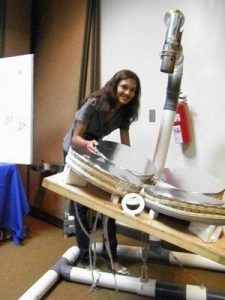
Student: Francel Rojas Simpson
Institution: Caribbean Bilingual School
Finalist winner of National Science and Technology Fair
ARES
Project ARES is a scale prototype which was built with the aim of implementation in industry, in the management of materials and substances dangerous to humans. This with the purpose of reducing the risk of damage to the health of workers. The ARES has three ways to control, the first is a small wired controller to manually control, the second automatic control is a basic technology developed (without the use of microprocessors or microcontrollers), able to reduce costs. And the third is a control computer, which can control the robot as if it were a video game in first person, with the possibility of control over the Internet. It is important to mention that the lack of economic resources produced a prototype with basic digital technology (from unused components), but very functional for any work involving the collection of objects that are dangerous for humans and also for instances that pose no danger.

Student: Luis Gerardo León Vega
Institution: Colegio José María Gutiérrez
Finalist winner of National ExpoINGENIERÍA
Using entomopathogenic fungus Metarhizium anisopliae for biological control of Aedes aegypti mosquito.
The research was based on using the entomopathogenic fungus, M. anisopliae, to eliminate mosquito eggs of Ae.aegypti as a biocontrol strategy for the populations of the species. The first phase of the project was to obtain the fungus and prepare different concentrations of the solution. The next part was to obtain the eggs of the Aedes aegyptimosquito. Followed immediately by the third stage of the project, which was the bio-test (application of the fungal solutions to the egg populations). The use of entomopathogenic fungi as biological control agents, and especially M.anisopliae is very effective because of its low impact on the environment and how simple and inexpensive the preparation is.
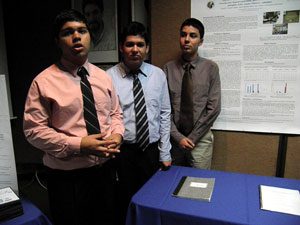
Students: Franklin Chacón Huete, Dylan Andrew Bartels Mora and Juan Carlos Cambronero Heinrichs
Institution: Science College Costa Rica – San Pedro Headquarters
Finalist winners of National Science Fair and Technology
Isolation and culture of protoplasts in edible aroid (Xanthosoma spp. And Colocasia sp.)
In this research the basic parameters were adjusted for the isolation, cultivation and electro fusion of protoplast in species susceptible and tolerant to various fungi, bacteria and parasites known as “Mal seco”(bad dry) and to facilitate the production of somatic hybrids resistant to the disease.
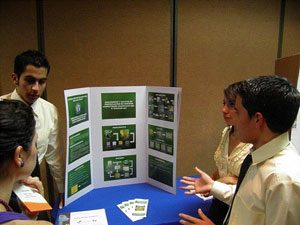
Students: Franklin Blanco Solano, Fabián Badilla Cambronero y Alessa Calderón Acuña
Institution: Science College Costa Rica – San Carlos Office
Finalist winners of National Science Fair and Technology
INNOVI: Interpretation of vibrating notes
The project is the design and creation of a device to facilitate music learning, especially in blind people, by interpreting vibration. The device is a vest that has seven vibrators, each representing a different note on the musical scale.
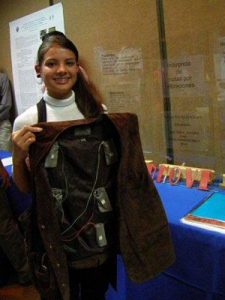
Students: José Miguel Gonzalez Arias y Nicole Alexandra Mena Mora
Institution: Don Bosco Technical College
Finalist winners of ExpoINGENIERÍA Nacional
Link: http://www.micit.go.cr/index.php/noticias-de-interes/749-diez-jovenes-gana-boleto-para-ir-a-la-feria-internacional-de-ciencia-e-ingenieria-de-intel-isef.html

